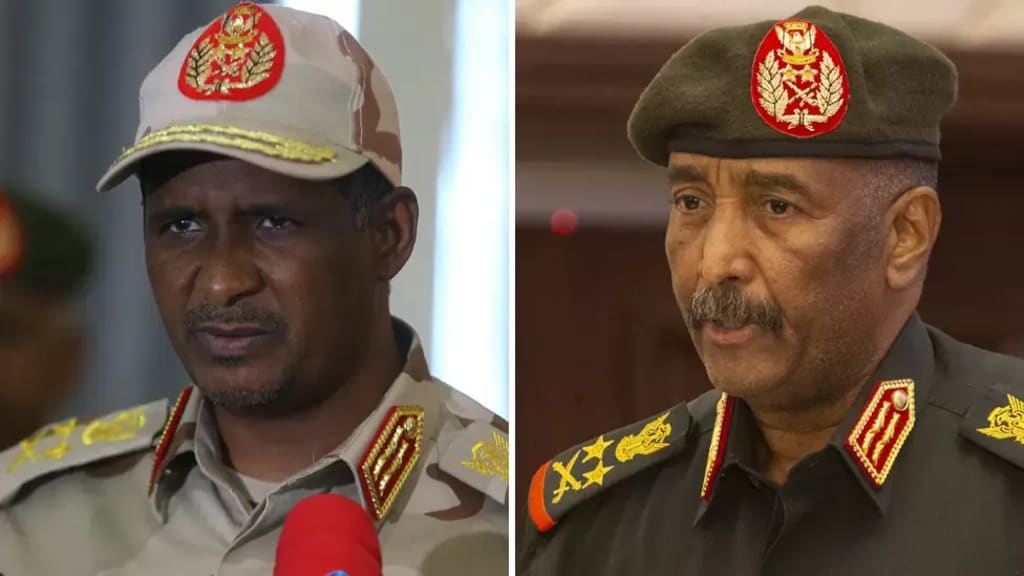How the two senior military officers in Sudan betrayed each other
An explanation of the conflict in Sudan

The terrible military dictatorship of President Omar Bashir endured for decades until the people rebelled. They desired democracy to exist in their nation. A few months later, these two men offered the demonstrators the future they had desired after aiding in the overthrow of Bashir in a coup.
The same two men are still at war with one another four years later, tearing apart Sudan and killing hundreds of civilians in the process. In what little amount of time, how did Sudan get from this... to this? And how did these two strong men turn from allies to rivals?
[Overlapping] - Conflicts in Sudan. -...a lethal coup......backup troops... Coups have a lengthy history in Sudan. Military men have brought down leader after leader. The nation's recognized armed forces, now called the Sudanese Armed Forces, or SAF, have dominated the nation for almost a century.
And as soon as Sudan was freed from Anglo-Ethiopian domination, they began to exercise that authority. "The flags of those two nations are now replaced by the Sudanese flag." In 1958, there was the first military coup that was successful. Retired military officer and current prime minister Abdullah Kalil toppled his civilian administration and established military rule over Sudan.
Colonel Jaafar Nimeiry successfully overthrew a democracy that was short-lived about ten years later. Then Nimeiry left in 1985. He was overthrown by this military officer, who then erected a new democratic administration. Colonel Omar Bashir overthrew this administration four years later and proclaimed himself the recently appointed head of state.
However, Bashir turned out to be distinct from his predecessors. Bashir was aware that he might meet the same end as earlier dictators due to the trend of military takeovers. Thus, he employed a tactic known as "coup proofing," in which he surrounded himself with defenders while maintaining control over each to prevent them from toppling him.
The SAF was the first. Bashir supported the troops and kept a close bond with them during his rule. To put an end to the civil war that was still raging in southern Sudan, where the SAF and its allies were brutalizing civilians under his orders, he significantly depended on them. Then, as the army was occupied in the south, preparations for a new conflict in the west began.
There was a crisis in Darfur. In the past, people in this area were ignored. For years, their lack of access to essentials like medical supplies and limited representation in Sudan's government caused them to feel uneasy. Thus, in 2003, a sizable section of the army was stationed in the South. Troops were attacked in this Darfuri city by rebel groups.
Upon realizing that a rebellion was underway, Bashir chose to arm and support local Arab militias in the area known as the Janjaweed rather than depending on the regular military, the Sudan Armed Forces, or SAF. At Bashir's command, this group was ruthless and concentrated on eliminating Darfuri rebels and civilians. Based on satellite photos, the destruction of approximately 3000 towns is most certainly the work of the Janjaweed.
In Darfur, SAF forces were accountable for the damage there as well. Both parties are charged with rape, mass murder, and purposeful relocation of populations. They killed thousands of Darfuris together.
Bashir learned how to hold onto power from the events in Darfur. And he looked to the Janjaweed to find another defender. There were two Janjaweed militia members that Bashir wanted to integrate into the central administration because he thought they were trustworthy.
However, Bashir had the utmost faith in one specific Janjaweed leader. Hemeti, or Mohamed Hamdan Dagalo. Bashir referred to him as "my shield." a specific parody of his nickname Hemeti versus the Arabic phrase Hemmati, which means "my protection."
When South Sudan gained independence in 2011, the bloody and protracted civil conflict in this region came to an end. putting Bashir in a precarious situation. And Sudan's economy collapsed shortly after. The South, which Bashir had lost control over, was home to many of the nation's oil resources.
In 2013, Bashir granted Hemeti and the Janjaweed formal status as a paramilitary group known as the Rapid Support Forces, or RSF, to consolidate his rule. The gang was first put under the control of NISS, one of Bashir's protection agencies in Sudan. even though they were aiding the SAF in the continuing conflict in Darfur.
Then, in 2017, he enacted legislation that put Hemeti squarely under his jurisdiction and made it abundantly evident that the RSF was primarily there to keep him safe.
In exchange for money, Bashir provided Hemeti financial independence, gave him authority over some of Darfur's gold mines, let him smuggle weapons and minerals into countries like Libya and Chad, and let him send troops into war-torn areas to keep the RSF loyal.
Meanwhile, Bashir persisted in allowing the SAF to participate in important sectors of the economy, such as the manufacturing of weapons and telecommunications. Civilians still face hardships even though Bashir was preoccupied with enriching these two forces.
2018 saw protests in a severe economic downturn. That was the moment when Bashir had to face his greatest obstacle: testing his defense plan. The government's budget, which allotted between 60 and 70 percent to the security sector—including Bashir's—was the final straw.
This resulted in the largest revolution Sudan has ever seen. Protests without warning started in several sections of the nation. After that, they relocated to the capital city of Khartoum. Bashir resisted leaving his position. He was supported by the RSF, SAF, and other security services, who also repressed the demonstrators who ultimately yearned for democracy.
However, the demonstrators persisted for months until the RSF and SAF realized that Bashir's leadership would no longer be helpful to them. Thus, on April 11th, 2019... they took a step that caught Bashir and the general public off guard Commanders in the SAF worked with Hemeti of the RSF to remove Bashir from office.
While protestors applauded Bashir's ouster, many had misgivings about the man who brought about the change. One day following the coup,
About the Creator
Enjoyed the story? Support the Creator.
Subscribe for free to receive all their stories in your feed. You could also pledge your support or give them a one-off tip, letting them know you appreciate their work.






Comments
There are no comments for this story
Be the first to respond and start the conversation.